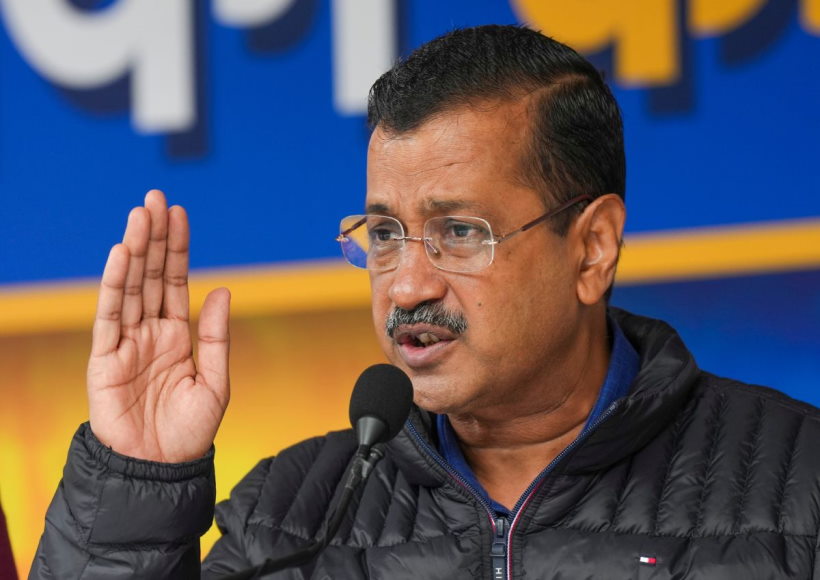New Delhi, January 30 (UITV)- The Election Commission of India (ECI) has given an opportunity to former Delhi Chief Minister and Aam Aadmi Party (AAP) National Convenor Arvind Kejriwal to prove the allegations of poisoning the Yamuna river water. The Commission has sought a clear explanation from Kejriwal on these allegations and specifically asked him to tell what substance was mixed in the Yamuna river water, in what quantity and how. The Commission has also asked how the Delhi Jal Board engineers identified this poisonous water and what was their contribution in it.
This controversy started when Arvind Kejriwal accused the government of deliberately increasing the ammonia level in the Yamuna river water, so that there was a conspiracy to make the water poisonous. He also claimed that this increased ammonia level was a danger of spreading a kind of water terrorism in Delhi and it would make it impossible to provide potable water to the people of Delhi. Kejriwal called it a well-planned conspiracy and alleged that the Haryana government had deliberately mixed poison in the Yamuna river. According to them, this incident could have turned out to be a conspiracy to unleash a genocide in Delhi.
The Election Commission of India (ECI) responded to the matter seriously and gave Kejriwal time till 29 January 2025 to provide facts and legal support to his allegations. However, Kejriwal’s reply was not up to the Commission’s expectations. There was no clarity in his reply and he could not provide any concrete evidence or facts to support the allegation. Following this, the EC sent him another letter, seeking clarification of the allegations and making it clear that his statement could cause unrest in society and conflict between communities, which could be detrimental to any democratic process.
The Commission also specifically requested that Kejriwal clarify the difference between the allegations of ammonia contamination and poisoning. The Commission said that linking these two allegations together could lead to misunderstandings. The Commission reminded Kejriwal that making inflammatory statements can lead to public unrest and social controversy, which can disrupt the electoral process and public relations.
The Commission’s letter also stated that water availability and sanitation are important parts of governance and all governments are responsible for providing safe and potable water. Further, the Commission clarified that the controversy arising over ammonia content in the Yamuna river and the allegations made by the Haryana government on this are being dealt with separately as it is a long-running and legal matter. The Commission also stated that they will not interfere in this issue but leave it to the responsibility of the concerned agencies and governments.
The ECI letter made it clear that the statement made by Kejriwal was dangerous and could cause controversy and hostility among different communities. The EC also asked Kejriwal why he accused the Haryana government of deliberately poisoning the Yamuna river and what concrete evidence was there in support of this allegation. The Commission also asked how the engineers of Delhi Jal Board identified this poisonous water and what steps they took to address the problem.
The EC also sought an explanation from Kejriwal as to why he termed poisoning of Yamuna river as an “act of war” and a “conspiracy to commit genocide in Delhi”. Further, the Commission raised the question that Kejriwal’s statement could cause any kind of hostility or pressure between the citizens of Delhi and Haryana, which may be detrimental to the society in future. The Commission reminded Kejriwal that in view of his position and responsibility, he should refrain from making such inflammatory statements which may promote hatred and dispute between any state or community.
The Commission also acknowledged that increased ammonia levels in Yamuna river may cause water pollution, but alleging poisoning of Yamuna river is a serious allegation and requires concrete evidence and facts. The Commission clarified that this matter will be resolved separately with the Haryana government and it will be closely monitored. Also, the EC requested Kejriwal to clarify the difference between water pollution and ammonia contamination and refrain from projecting it as a conspiracy or poisoning.
Finally, the Commission explained that availability of clean and safe water is the primary responsibility of a government and it is the duty of all governments to ensure that every citizen gets potable water. Despite this, the EC also said that this issue should not be a part of any kind of electoral strategy and all concerned governments and agencies should be allowed to work on this issue.
The EC also asked Arvind Kejriwal to refrain from making such controversial statements in future as it may not only create unrest in the political atmosphere but also generate disagreement and division among citizens. The Commission also warned that such statements may pose a threat to the electoral process and the values of democracy.











